- Home
- Donald Hamilton
Mad River Page 2
Mad River Read online
Page 2
Cohoon asked, "Was it the Apaches, Uncle Van?"
Van Houck shook his head. "There are some who would like us to think so, but it was no Apache. One man it was, with iron shoes on his horse. I am too old to ride with posses, but I heard the men talk when they came back—those that were not afraid to talk, or in Westerman's pay. One horse. One man. He met your father outside of town. Whether the meeting had been arranged or was an accident no one knows. They talked for a while. Your father turned to ride away. Would he have turned his back on an Apache, after fifty years on the plains? The man shot him. The stock of your father's rifle was broken off short; he had tried to pull the gun out as he fell, and snapped it off at the grip instead, The broken wood was still in his hands when he was found."
Cohoon said, "And Jonathan?"
"The murderer rode directly to the ranch. Perhaps he was afraid that Jonathan knew whom your father had gone out to meet; perhaps he just realized that he would have to deal with Jonathan sooner or later, and preferred to take him unawares. Jonathan was shot as he opened the door. Would Jonathan have opened the door to an Apache, without even a gun in his hand? The murderer then shot down the cook, old Leonardo, as he ran for the corral, and set fire to the house. When the hands got there—they were working to the east— two hours or more had passed. They lost the trail up in the rocks. The posse caught up with them while they were still trying to work it out. Finally Westerman said to call it a day; it was obviously the work of a prowling Indian, and he would notify the authorities."
"Paul Westerman led the posse?" Cohoon said.
"Yes. We still have no law here, my boy, except when the U.S. Marshal condescends to pay us a visit. Well, now we've got a town marshal of sorts to keep order here in Sombrero, but he was out of town and this was out of his jurisdiction anyway. Westerman rounded up a group of citizens and made a little speech, saying that at a time like this personal feelings were unimportant; a crime like this was a threat to every member of the community, and the criminal had to be caught and punished."
"That was public-spirited of Mr. Westerman," Cohoon drawled.
Van Houck was watching him. "Boyd, what are you going to do?"
Cohoon hesitated, and moved his shoulders slightly. "What can I do, Uncle Van? The man apparently left no clues except a set of hoof-prints leading nowhere. What can I do against a ghost?"
"This was no ghost," Van Houck said harshly, "and no Apache, either. We know who it was, Boyd. It was a white man; a white man with a burning hate against the Cohoons. The same man who tried so hard to put a rope around your neck at the trial; who publicly proclaimed, when you were led away to prison, that .the matter was not finished yet." Cohoon said mildly, "You can't put too much weight on what a grief-stricken man says and does, Uncle Van. Harry's death hit him hard, and he blamed me for it. He is the type of man who must blame somebody for everything that happens to him."
Van Houck said, "Ah, that Harry Westerman was a no-good young trouble-maker, and you should have had more brains than to get mixed up with him. I must say that I still do not believe everything that was said at the trial, nor do a great many other people, Boyd." The old man looked searchingly into the face of his visitor, who laughed shortly.
"I'm glad for everybody's good opinion, but it's ca matter of public record, and I've never denied it. But there's one thing wrong with your choice of a murderer, Uncle Van."
"What's that?"
"Why," Cohoon said, "neither Father nor Jonathan were fools. The fact that neither was holding a gun when he died may prove it was-no—Apache that killed them, but it also proves to my satisfaction that it wasn't Paul Westerman. They wouldn't have trusted him any farther than an Indian."
Van Houck shrugged, totally unconvinced. "So? Then he hired somebody. He hires many people these days. A stranger perhaps."
Cohoon said, "Perhaps. But there's no proof of that."
The old trader stared at him. "You are going to do nothing, Boyd? You are just going to forget it?"
"It would be a little hard to forget, Uncle Van," Cohoon said gently. "However, I have just spent five years of my life waiting to get out of prison; I don't intend to turn around and shoot my way right back in again—on no more than a shaky guess."
"Your father—"
"l know," Cohoon said. "Father would have gone roaring after Westerman and challenged him to prove his innocence. So would Jonathan, or Stuart, if they had lived. But I'm not any of them. That's One thing I discovered in Yuma." He looked down at Van Houck and smiled. "You know, Uncle Van, I learned something in that place. I never was as big as the rest of them, or as handy with weapons, and I couldn't hold as much liquor or make as much noise, but in Yuma I was a better man than any of them. They would have tried to buck the system, and it would have broken and killed them. I rode along with it, and here I am. Now you want me to buck this system and get myself killed or hanged. Well, if you don't mind, Uncle Van, I reckon I'll just ride along with it for a piece, like I did in Yuma."
Van Houck said harshly, "Maybe this will make you change your mind." He turned and marched to the rear of the store, his back stiff and angry. Returning, he threw down three objects on the nearby counter. "I saved these for you. I thought you would be needing them. The gun can be repaired. I have also, by your father's will, paid the taxes on the Grant from the money he had in the bank; there's enough left to help you get started again. Of course you need no money for anything I can supply."
Cohoon looked for a moment at the broken Henry rifle, and the splintered stock that lay beside it, touching the latter gently. "Thanks, Uncle Van."
Van Houck's voice said, "He had it in his hands when he was found. He never got to use it!"
Cohoon turned to the knife in its worn leather sheath and pulled it free. The blade was hand-ground of file steel. The leather grip, as well as the sheath, had been burned with the Cohoons' Diamond C brand. Cohoon spoke softly: "He always said that a good knife was worth a dozen pistols in a fight; and when there was nobody to fight you could always whittle."
"You're going to let his murderer go free?" Van Houck asked insistently. "You're going to live in the same town with the man who killed him, and do nothing?"
Cohoon set the knife back into the sheath with a sharp movement. "Why, I can stand it as long as he can, Uncle Van," he murmured. "Maybe even a little longer. It remains to be seen."
3
OUTSIDE THE AIR was quite cool, and Cohoon drew a deep breath of it, turned left, and walked quickly away. The heavy-set, bearded man who chose this moment to come out of the alley between the buildings was also moving in a hurried manner. There was time for neither man to stop. The impact threw Cohoon sideways, and sent the other back a step with a hand to his shoulder, gouged by the barrel of the broken rifle in Cohoon's hand. The man was dressed, Cohoon noted, in the rough stained clothing of a prospector or miner.
"My apologies," Cohoon said mildly, although the fault had been by no means entirely his.
"Apologies! Why the hell don't you watch where you're going?"
There was no profit in this, and Cohoon turned and walked on. He had taken three steps when the other's hand swung him about so roughly that the weapons he was carrying spun out of his grasp.
"I asked you a question, stranger. Why the hell don't you watch where the hell you're going?"
Cohoon looked at the bearded face for a moment, not really hearing the words, feeling only the contemptuous hand on his shoulder that reminded him of the brutalities and indignities he had suffered without protest for five years, knowing that was the only way to survive. But this was not Yuma. This man had no badge, and the law was not behind him. Cohoon spoke softly. "Take your hand away."
"Why, you young pipsqueak—"
Cohoon drew a long breath. The bearded face seemed to swim before him in a kind of shimmering haze, but his mind was quite clear despite the anger. His muscles tightened imperceptibly in preparation for the quick seizing of the hairy wrist, the pivot, and the throw tha
t would send the other over his shoulder into the dust of the street below, followed by his own body, feet-first, driving hard to crack the ribs and empty the lungs, after which the boots could finish the job at leisure. There had been no gentlemanly eastern rules taught in those daily practice sessions out by the corral. Never give the other man a break until he's our cold, had been Ward Cohoon's repeated advice to his sons.
Cohoon turned slightly, casually, for better leverage, and instinct made him cast a glance around to fix in his mind the location of others who might intervene—and slowly he let his pent-up breath escape, because the street was quite still, waiting, and over by the hotel stood a slender man in dark clothes on whose shirt-front glinted the metallic emblem of the law, He should have recognized that waiting silence the instant he came out of the store, but he had been in too much of a hurry to escape Van Houck's reproachful gaze. This was a trap. This was Paul Westerman's marshal, ready to throw an ex-convict in jail on any excuse. A brawl would be reason enough for the law to take a hand.
Cohoon reached up and gently disengaged the hand from his shoulder and let it fall. "I'm sorry, partner," he said. "Reckon I was a little careless. No harm intended."
The bearded man was confused by the sudden lack of opposition. He growled without conviction, "No harm? Why, you like to broke my shoulder! Somebody ought to teach you to look out where you wave that gun barrel!"
Cohoon said, "I'm sorry. I'll be more careful in the future." The larger man stared at him in a baffled way, and looked around, as if for a cue or signal. Then he said, "Ah, hell," and swung away, and strode off down the boardwalk.
Cohoon watched him go, aware that around him the scene was breaking into motion again as people started off about their business, some looking at him curiously, others ignoring him. It seemed strange that he should recognize none of them; five years before, an unfamiliar face would have been an exception on the streets of Sombrero. He grimaced, picked up his belongings, and started toward the hotel.
"Cohoon."
It was the slender man with the badge, who had crossed over and come up this side of the street. Cohoon waited for him, watching him approach. At close range, it was apparent that the marshal was much younger than he had seemed at a distance. The neat, somber clothes, that might have belonged to a preacher, except for the badge of office and the heavy gun and belt, were deceiving. The face was that of a man a year or two younger than Cohoon himself. It was a sober and humorless face despite its youth, clean-shaven, and set in stern lines—it was the face of a young man constantly aware that the eyes of his fellow citizens were upon him Recognition struck Cohoon quite suddenly, and he spoke without thinking, "My God. It's Willie Black!"
He saw the young marshal wince slightly, and realized his mistake. He had been undiplomatic, remembering the thin, dirty kid who, cursed and kicked by his drunken parent, used to hold the horses and tend the lines at Black's Ferry. He remembered also the hatred on Willie Black's pale face when they had pulled him out of the river that day after Jonathan's practical joke—Jonathan's humor, like his father's, had been heavy-handed at times. But it would be Bill Black now, marshal of Sombrero, and no thanks to anyone who reminded him of the past.
"What are your plans, Cohoon?" Black asked, stopping before him.
Cohoon moved his shoulders briefly and did not speak. "I'm giving you fair warning," the marshal said. "The time is past when the Cohoons could ride into this town and take it apart for their own amusement. When you visit Sombrero from now on, do so peaceably, or by God I'll arrest you and send you right back to the place from which you've just come. I don't care if your folks came into this country with Coronado. To me you're just another tough one who got himself caught." It was a harsh speech, deliberately provoking; and Cohoon looked at the younger man with wonder and some amusement. "That's the second fight I've had offered me in two minutes," be murmured.
Black flushed, and the old hatred showed clearly in his eyes. He said stiffly, "I am merely doing my dutys which is to keep the peace."
"I'm not the one who's threatening it," Cohoon said, and walked on.
The lamps were already lighted in the hotel when he entered. The clerk at the desk addressed him by name and had a room key ready for him. Cohoon looked at the key and pursed his lips.
"Room twenty-one," the clerk said, a little too quickly. Cohoon nodded, picked up the small grip that had been put off the stage for him, and climbed the stairs. The room was on the right hand side of the dank and narrow hall, halfway down. Light showed under the ill-fitting door. Cohoon whistled a soundless tune, and shifted the objects he was carrying in such a way that his father's heavy knife was ready to his hand. He unlocked the door with the key, and let it swing open.
The man sitting on the bed said, "Welcome home, Boyd."
Cohoon nodded,stepped inside, kicked the door shut, and dropped his belongings onto a nearby chair, except for the broken rifle, which he leaned against the dresser.
"There was your bully-boy," he said, "and your tame marshal, and now there's you, Mr. Westerman."
"You do young Black an injustice," Paul Westerman said. "He's his own man. I merely use him, without his knowledge."
"Which brings up the question," Cohoon said, "is it worse to be crooked, or stupid?"
Westerman smiled. "There's whisky On the dresser, Boyd. Help yourself. Sit down. We have a number of things to talk about... Thanks, I'll have one too, Good whisky is its own excuse, in any company."
Cohoon picked up a straight-backed wooden chair and swung it about so that he could straddle it. Sitting down, he glanced around the room and saw no hiding place for another man, although there were doubtless others, well-armed, in the adjoining room that was separated from this one only by a flimsy door. Even five years ago, Paul Westerman had seldom gone anywhere unescorted. Not so much that he needed protection, as that he obviously liked the feeling of power it gave him to have armed men at his back. This was necessary to him, since he was a small man.
Five years had been kind to him, Cohoon saw. The added stockiness time had brought to his short figure only gave it dignity, and this was emphasized by the gray that had appeared at his temples: for all his lack of height, Paul Westerman made an impressive appearance nowadays. His clothes were conservative and well cut—even five years ago he had still clung to some habits of dress from his gambling days, but these were gone now. It was hard to remember, looking at him, that this man had once worked in one of the shabbier places on Creek Lane, when Creek Lane was little more than a cluster of ill-favored shanties. He probably owned the Lane by now; he had been well on the way five years ago. Perhaps, Cohoon reflected, he owned this hotel as well; at least it was obvious that he owned the clerk at the desk.
"I brought no gun, if that's what you're looking for," Westerman said abruptly.
Cohoon thought this was unlikely; an ex-gambler would have a derringer or similar weapon concealed somewhere, no matter how respectable his outward appearance had become. But there was nothing to be gained by arguing the point.
"Neither did I," Cohoon said, "except for that." He indicated the broken rifle with a jerk of his head.
Westerman smiled. "In your father's hands, the knife on that chair was the equal of any revolver, I'd be surprised if he hadn't taught you how to use it." Cohoon did not speak. Westerman's smile faded, and was replaced by a look of grave sympathy. "I was genuinely sorry to hear of his death, Boyd, and that of your brother, and I did my best to help catch the murderer. I want you to believe that. I also want you to believe that I had no part in the crime, as has undoubtedly been suggested to you already. I like to think that I have a logical mind. I want to see justice done—some might call it Vengeance —but I would not want anybody to think I had ventured upon an irrational blood feud. I had nothing against the rest of your family, and I had nothing to do with those killings, Boyd. I want you to believe me, really I do."
"Does it matter?" Cohoon asked.
Westerman spread his hands an
d shrugged. "Perhaps not. Your opinion isn't very important, is it? You were a fool to come back. If you had just vanished into thin air after your release—well, as I say, I have a logical mind, and an economical one. Why should I bother to spend time and money chasing after you? It would not bring Harry back, and a hatred can starve in five years with nothing to feed it. I would have let you go. But instead you came back here to remind me... That boy was everything to me, Boyd. My one sentimentality. He reminded me of his mother who gave her life to bear him. He wasn't much good, Boyd, I am aware of that. I don't deceive myself that my boy was an angel. Nevertheless, he was mine, and you took him from me."
"Hardly that, Mr. Westerman," Cohoon said mildly. "It was one of the passengers who shot Harry, not I."
A spasm of anger crossed Westerman's face. "And you were supposed to cover the passengers; that was your job! It you had to involve my boy in a robbery, you could at least have done your share! Instead of which you took to your heels like a rabbit at the first sign of trouble and left Harry to be shot down by that fool of a drummer with his bulldog revolver!"
"After Harry had first shot the guard in cold blood," Cohoon said dryly. "Perhaps I hadn't bargained for deliberate murder, Mr. Westerman."
"Oh, I'm sure you had the highest motives for deserting your partner!" Westerman said sarcastically. "No Cohoon could simply lose his nerve and run, could he? Nevertheless, Harry is dead. I took care of that drummer years ago—something I regret now, since the man could hardly be blamed for taking advantage of his opportunity. But you, who gave him the opportunity ...!" Westerman checked himself abruptly and rose. "That was five years ago, Boyd. I am not a monomaniac. As I say, I regret having had that poor man killed, but it was done in the heat of passion. There's no passion left in me now. I simply can't stand having you around." He picked up his hat and walked to the door. "If you leave Sombrero by the first stage out, no One will follow you. You can pick up your life somewhere else, and you wilt not be harmed as long as you never come back here. If you choose to stay, however, I will not answer for the consequences, That's what I came here to say, Boyd. Good day."

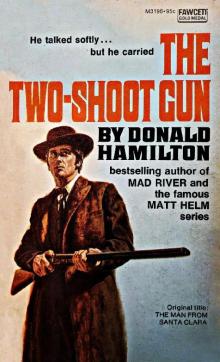 The Two-Shoot Gun
The Two-Shoot Gun Mad River
Mad River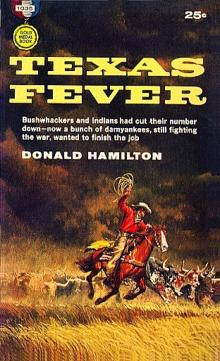 Texas Fever
Texas Fever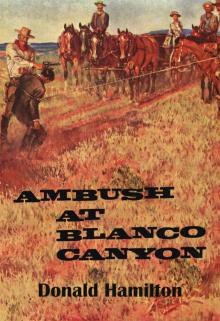 Ambush at Blanco Canyon
Ambush at Blanco Canyon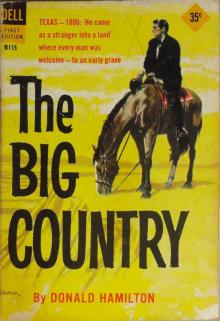 The Big Country
The Big Country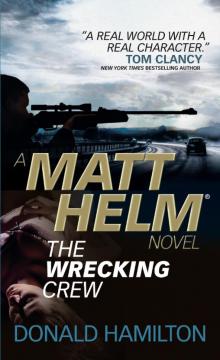 The Wrecking Crew
The Wrecking Crew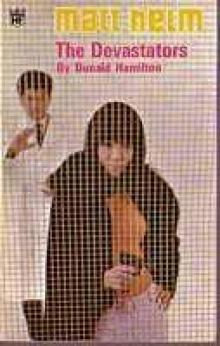 The Devastators mh-9
The Devastators mh-9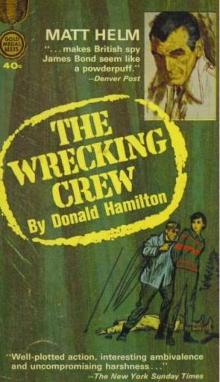 The Wrecking Crew mh-2
The Wrecking Crew mh-2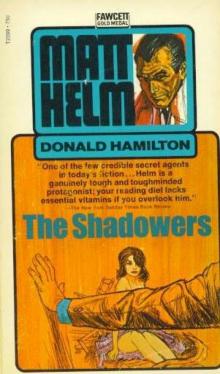 The Shadowers mh-7
The Shadowers mh-7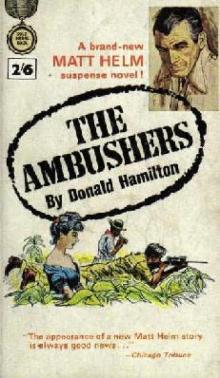 The Ambushers mh-6
The Ambushers mh-6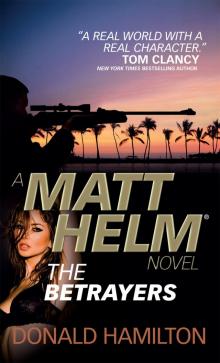 The Betrayers
The Betrayers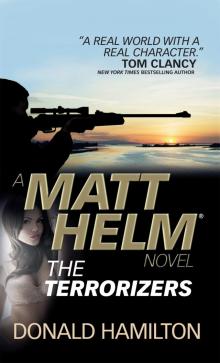 The Terrorizers
The Terrorizers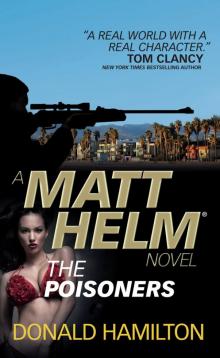 The Poisoners
The Poisoners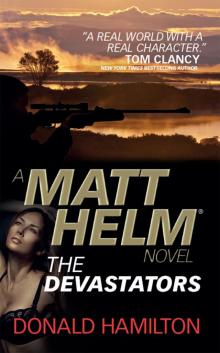 The Devastators
The Devastators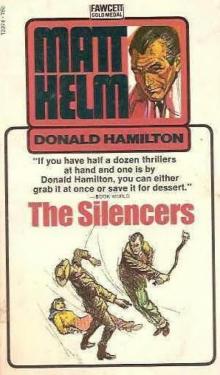 The Silencers mh-5
The Silencers mh-5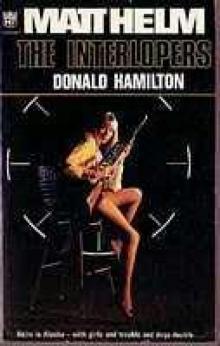 The Interlopers mh-12
The Interlopers mh-12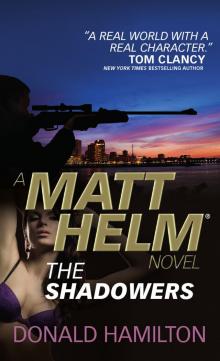 The Shadowers
The Shadowers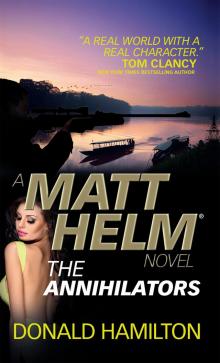 The Annihilators
The Annihilators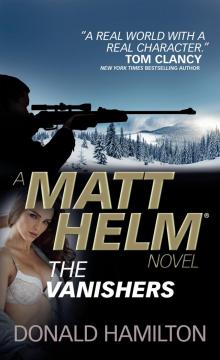 The Vanishers
The Vanishers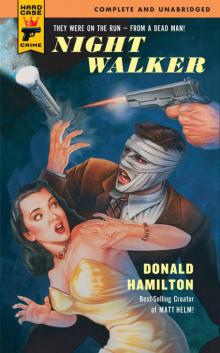 Night Walker
Night Walker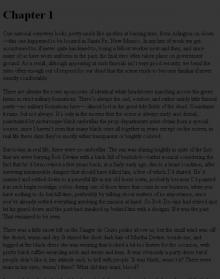 The Revengers
The Revengers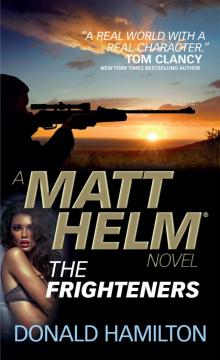 The Frighteners
The Frighteners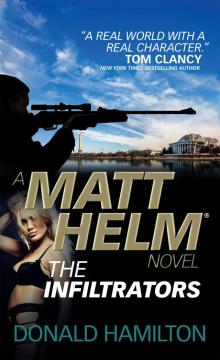 The Infiltrators
The Infiltrators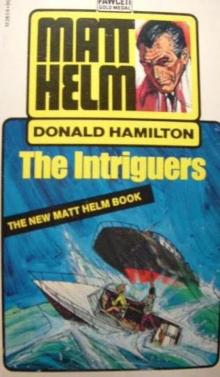 The Intriguers mh-14
The Intriguers mh-14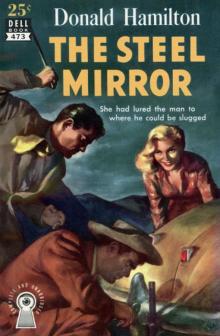 The Steel Mirror
The Steel Mirror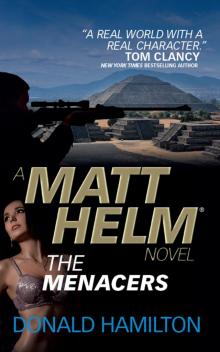 The Menacers
The Menacers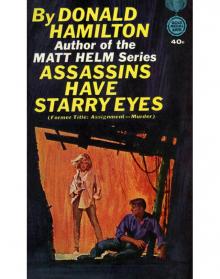 Assassins Have Starry Eyes
Assassins Have Starry Eyes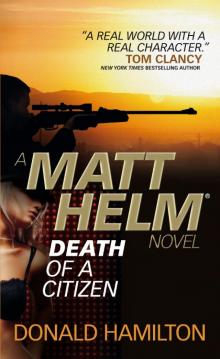 Death of a Citizen
Death of a Citizen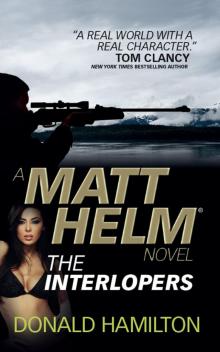 Matt Helm--The Interlopers
Matt Helm--The Interlopers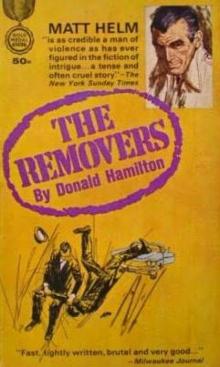 The Removers mh-3
The Removers mh-3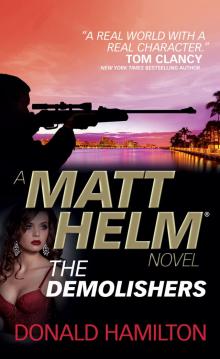 The Demolishers
The Demolishers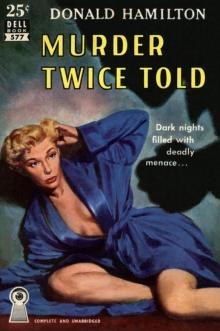 Murder Twice Told
Murder Twice Told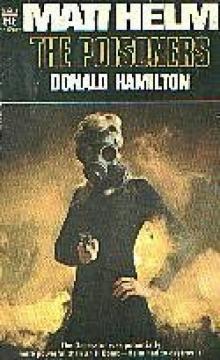 The Poisoners mh-13
The Poisoners mh-13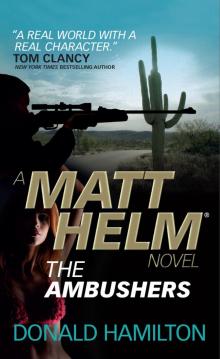 The Ambushers
The Ambushers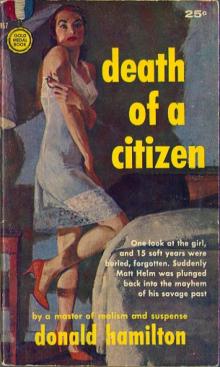 Death of a Citizen mh-1
Death of a Citizen mh-1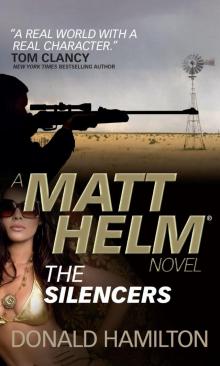 The Silencers
The Silencers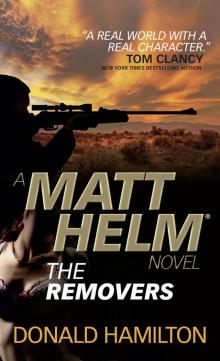 The Removers
The Removers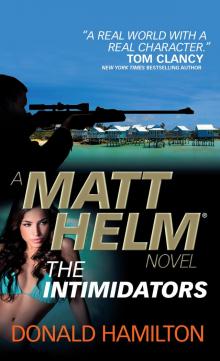 The Intimidators
The Intimidators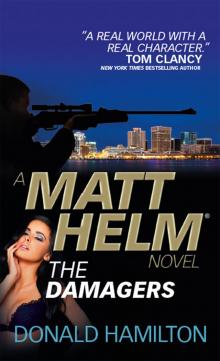 The Damagers
The Damagers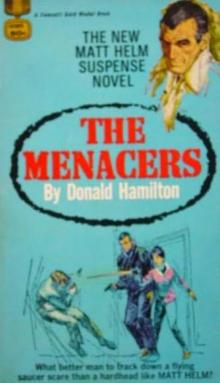 The Menacers mh-11
The Menacers mh-11 The Retaliators
The Retaliators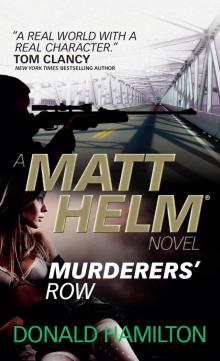 Murderers' Row
Murderers' Row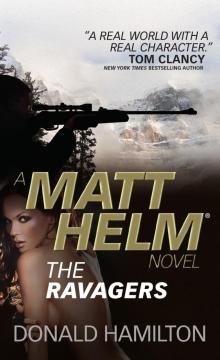 The Ravagers
The Ravagers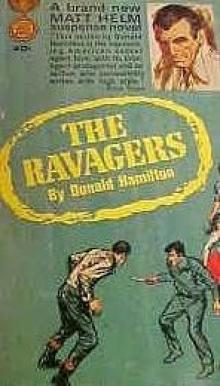 The Ravagers mh-8
The Ravagers mh-8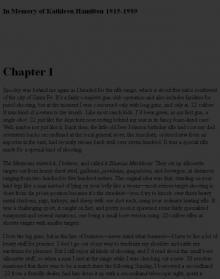 The Threateners
The Threateners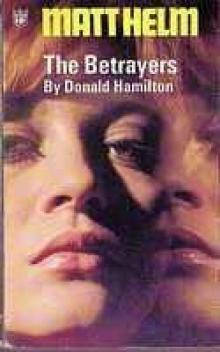 The Betrayers mh-10
The Betrayers mh-10